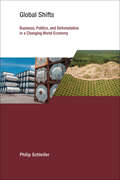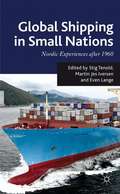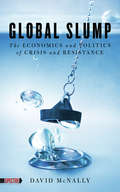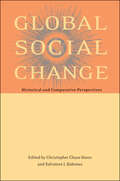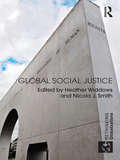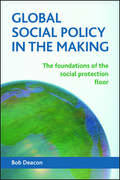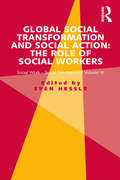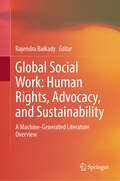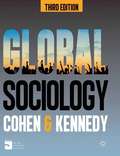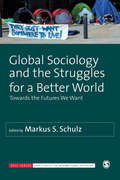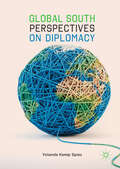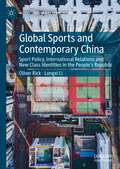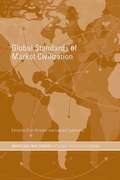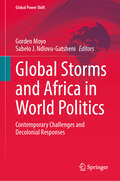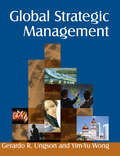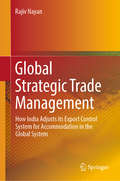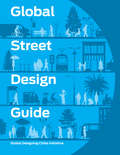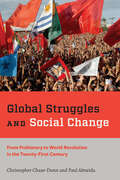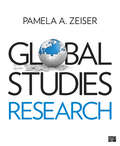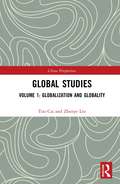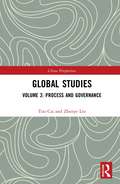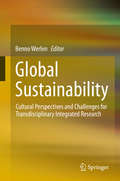- Table View
- List View
Global Shifts: Business, Politics, and Deforestation in a Changing World Economy
by Philip SchleiferWhat global shifts in markets and power mean for the politics and governance of sustainability.In recent years, major shifts in global markets from North to South have created a new geography of trade and consumption, particularly in the agricultural sector. How this shift affects the governance of sustainability, and thus the future of the planet, is the pressing topic Philip Schleifer takes up in this book. The processes of twenty-first-century globalization are fundamentally changing the politics and governance of commodity production, Schleifer argues, with profound implications for the environment in the food-producing countries of the Global South. At the center of Schleifer's study are Brazil and Indonesia—two key sites of experimentation in new models of global environmental and commodity governance—where palm oil and soy supply chains have seen unprecedented degrees of private environmental governance in recent years. However, instead of transforming these industries, the diffusion of transnational sustainability standards has accompanied a worsening ecological crisis, with mounting evidence of increasingly strong links between deforestation and globalization in twenty-first-century agricultural trade. To uncover the causes of this governance failure, Schleifer develops a multi-level framework for analyzing how contemporary globalization is reconfiguring the political economies of such industries. The result is the first comprehensive analysis of the shift of global agricultural trade to the South and the deepening crisis of commodity-driven deforestation—and a complex and evolving picture of both the risks and opportunities for sustainability presented by this transformative shift.
Global Shipping in Small Nations
by Stig Tenold Martin Jes Iversen Even LangeThis anthology aims to explain why some Nordic shipping companies became world leaders while others failed to respond effectively to the challenges and opportunities of globalization. The authors analyse political and institutional patterns alongside the various corporate responses to the many upheavals of global shipping.
Global Slump: The Economics and Politics of Crisis and Resistance (Spectre)
by David McNallyInvestigating the global financial meltdown as the first systemic crisis of the neoliberal stage of capitalism, this analysis argues that—far from having ended—the crisis has ushered in a period of worldwide economic and political turbulence. In developing an account of the crisis as rooted in fundamental features of capitalism, this study challenges the view that capitalism's source lies in financial deregulation, and highlights the emergence of new patterns of world inequality and new centers of accumulation, particularly in East Asia, and the profound economic instabilities these have produced. This original account of the "financialization" of the world economy during this period explores the intricate connections between international financial markets and new forms of debt and dispossession. Analyzing the massive intervention of the world's central banks to stave off another Great Depression, this study shows that while averting a complete meltdown, this intervention also laid the basis for recurring crises for poor and working class people: job loss, increased poverty and inequality, and cuts in social programs. Taking a global view of these processes, exposing the damage inflicted on countries in the Global South, as well as the intensification of racism and attacks on migrant workers, this book also traces new patterns of social and political resistance—from housing activism and education struggles, to mass strikes and protests in Martinique, Guadeloupe, France, and Puerto Rico—as indicators of the potential for building anticapitalist opposition to the damage that neoliberal capitalism is inflicting on the lives of millions.
Global Social Change: Historical and Comparative Perspectives
by Christopher Chase-Dunn and Salvatore J. BabonesThis informative and exciting volume brings together accomplished sociologists and scholars to offer an introduction to ways of studying and understanding global social change.The essays in Global Social Change explore globalization from a world-systems perspective, untangling its many contested meanings. This perspective offers insights into globalization's gradual and uneven growth throughout the course of human social evolution. In this informative and exciting volume, Christopher Chase-Dunn and Salvatore J. Babones bring together accomplished senior sociologists and outstanding younger scholars with a mix of interests, expertise, and methodologies to offer an introduction to ways of studying and understanding global social change.In both newly written essays and previously published articles from the Journal of World Systems Research, the contributors employ historical and comparative social science to examine the development of institutions of global governance, the rise and fall of hegemonic core states, transnational social movements, and global environmental challenges. They compare post–World War II globalization with the great wave of economic integration that occurred in the late nineteenth century, analyze the rise of the political ideology of the "globalization project"—Reaganism-Thatcherism—and discuss issues of gender and global inequalities.
Global Social Justice (Rethinking Globalizations)
by Heather Widdows Nicola J. SmithGlobal Social Justice provides a distinctive contribution to the growing debate about global justice and global ethics. It brings a multi-disciplinary voice – which spans philosophical, political and social disciplines – and emphasises the social element of global justice in both theory and practice. Bringing together a number of internationally renowned scholars, the book explicitly addresses debates about the scope and hierarchies of justice and considers how different approaches and conceptions of justice inter relate. It explores a diversity of themes relating to global social justice including globalisation, human rights, ecological justice, gender and sexuality, migration and trafficking, global health challenges, post-conflict resolution and torture. Global Social Justice will be vital reading for anyone interested in the political/philosophical theories and practical issues surrounding global social justice, including students and scholars of Political Science, International Relations, Philosophy, Global Ethics, Environmental Studies, Development Studies, Human Rights Law and Global Studies.
Global Social Policy in the Making: The Foundations of the Social Protection Floor
by Bob DeaconThe global economic crisis continue to dominate headlines, yet measures to build a social floor under the global economy and reform global governance have received little attention. In 2012 the Social Protection Floor was adopted as a global social policy measure ensuring that all could have access to essential health care and income security over their lifespan. This book by the world’s leading authority on global social policy examines why and how the Social Protection Floor became ILO, UN and G20 policy and how the World Bank and IMF took steps to lay its foundation. Bob Deacon explains this development in terms of four influences: firstly, shifts in the global social structure, secondly, processes inside international institutions, thirdly, global actors -sometimes individuals - using their positions to make change, and fourthly, shifting discourses about social protection. This much-needed contribution to the field of global social policy will be of interest to students of international relations, international organization and development studies and should be read by international civil servants in global agencies.
Global Social Transformation and Social Action: Social Work-Social Development Volume III
by Sven HessleGlobal social transformation calls for global social action. 2010 saw the launch of The Global Agenda for Social Work and Social Development, which detailed how social workers can strive to bring about increased social justice. The time is right to start to address and demonstrate the actions that might be required to develop and accomplish the Agenda - with regard to methods in practice and research, in social policy and social work education, and in a broader discourse of global commitment and cooperation. This informative and incisively written edited collection brings together experts from around the world to discuss issues which the social work and social welfare sectors face every day and to ensure a closer link between evidence-based practice, policy objectives and social development goals. Furthermore, this book reveals how these may affect the conditions of people and demonstrate how the social work and social development community can contribute to sustainable development.
Global Social Work: A Machine-Generated Literature Overview
by Rajendra BaikadyThis book is a product of human-machine collaboration in social work and is a premier in global social work education and practice. Each chapter is organized by the book editor with a human-written introduction. Chapters focus on contemporary issues, providing an updated, comprehensive and in-depth understanding of the latest developments in the field of social work, including social work with marginalized communities, social work and social policy, social work and human rights, social work advocacy, social activism, social work and sustainability. It offers comprehensive literature on global social work, its challenges and future directions. Chapters in this book help readers understanding contemporary debates, discussions and insights on global social work and its growth and development. The book is immensely useful for scholars studying social work, policy, welfare, exclusion and inclusion, sociology and other social science discipline. It is equally valuable to undergraduate and postgraduate social work students across all educational institutions without boundaries. The auto-summaries have been generated by a recursive clustering algorithm via the Dimensions Auto-summarizer by Digital Science. The editor of this book selected which Springer Nature content should be auto-summarized and decided its order of appearance. Please be aware that these are extractive auto-summaries, which consist of original sentences, but are not representative of its original paper, since we do not show the full length of the publication. Please note that only published SN content is represented here, and that machine-generated books are still at an experimental stage.
Global Sociology
by Paul Kennedy Robin CohenGlobal Sociology is the authority on global issues in contemporary society, introducing key sociological topics, themes and debates from a consistently global point of view. Deep connections are made between the "everyday" and globalization processes, with focus on how individuals perceive, react to or cope with incoming global forces and incorporate them into their private worlds. Global Sociology: offers strong coverage of contemporary topics, such as intimacy, financial sociology and the environment takes an unbiased approach which encourages critical thinking, optimism, and social consciousness provides an explicitly sociological focus alongside political, cultural, economic and anthropological perspectives, highlighting how concepts from these disciplines interact. The new edition has been thoroughly updated to include: discussions of recent topics and events such as the recession, new uses of social media, the Arab Spring and the Occupy movement new sections on finance and economic sociology, family, technology, and the environment more in-depth debate on sociological theory and discussion of key sociological terms a new "A pause to reflect" feature which encourages students to engage critically with chapter content. Global Sociology has been streamlined and restructured to better suit teaching needs and to strengthen linkages between similar themes throughout.
Global Sociology and the Struggles for a Better World: Towards the Futures We Want (SAGE Studies in International Sociology)
by Dr Markus S. SchulzThe contemporary world has reached a pivotal moment of escalating injustices and apocalyptic risks, but also of unprecedented opportunities. Mounting pressures of social and ecological problems are met by a confluence of intellectual trends that allow the questioning of entrenched assumptions and the unleashing of a forward-oriented sociological imagination. In Global Sociology and the Struggles for a Better World, a diverse collection of regional experts explore contemporary trends, alternative visions, and new directions for sociological research, raising issues that reflect the complexity of challenges facing future projects on a shared planet. Topics include: Feminist and Indigenous Perspectives in Latin America An African-centred approach to Knowledge Production Post-Islamist Democracy Based on the revised papers of the Opening and Closing Plenaries of the Third ISA Forum of Sociology in Vienna, Austria, July 2016, which Markus Schulz organized on the theme “The Futures We Want: Global Sociology and the Struggles for a Better World.”
Global Sociology and the Struggles for a Better World: Towards the Futures We Want (SAGE Studies in International Sociology)
by Dr Markus S. SchulzThe contemporary world has reached a pivotal moment of escalating injustices and apocalyptic risks, but also of unprecedented opportunities. Mounting pressures of social and ecological problems are met by a confluence of intellectual trends that allow the questioning of entrenched assumptions and the unleashing of a forward-oriented sociological imagination. In Global Sociology and the Struggles for a Better World, a diverse collection of regional experts explore contemporary trends, alternative visions, and new directions for sociological research, raising issues that reflect the complexity of challenges facing future projects on a shared planet. Topics include: Feminist and Indigenous Perspectives in Latin America An African-centred approach to Knowledge Production Post-Islamist Democracy Based on the revised papers of the Opening and Closing Plenaries of the Third ISA Forum of Sociology in Vienna, Austria, July 2016, which Markus Schulz organized on the theme “The Futures We Want: Global Sociology and the Struggles for a Better World.”
Global South Perspectives on Diplomacy
by Yolanda Kemp SpiesThis volume is a comprehensive overview of the various methods used in contemporary diplomatic practice. It incorporates the traditional modes of diplomacy and explains how these modes have evolved to deal with a burgeoning international community of state and non-state actors, the information and communications revolution and the changing profile of global conflict. The pursuit of “development diplomacy” is an integral part of the project, with due attention to the fault-lines, microcosms of power-politics and rapid evolution within the society of states that make up the Global South. All chapters are extensively illustrated with recent case examples from across the world.
Global Sports Fandom in South Korea: American Major League Baseball and Its Fans in the Online Community (Palgrave Series of Sport in Asia)
by Younghan ChoThis book explores the transformation of cultural and national identity of global sports fans in South Korea, which has undergone extensive cultural and economic globalization since the 1990s. Through ethnographic research of Korean Major League Baseball fans and their online community, this book demonstrates how a postcolonial nation and its people are developing long-distance affiliation with American sports accompanied by nationalist sentiments and regional rivalry. Becoming an MLB fan in South Korea does not simply lead one to nurturing a cosmopolitan identity, but to reconstituting one’s national imaginations. Younghan Cho suggests individuated nationalism as the changing nature of the national among the Korean MLB fandom in which the national is articulated by personal choices, consumer rights and free market principles. The analysis of the Korean MLB fandom illuminates the complicated and even contradictory procedures of decentering and fragmenting nationalism in South Korea, which have been balanced by recalling nationalism in combination with neoliberal governmentality.
Global Sports and Contemporary China: Sport Policy, International Relations and New Class Identities in the People’s Republic (Global Culture and Sport Series)
by Oliver Rick Longxi LiThis book examines the formation of a globally oriented sports system in China, from the beginning of the reform process in 1978 to the present, focusing on the period after the Beijing 2008 Olympic Games. It analyses how this system has shaped domestic social class identities and its role in international Chinese state politics. Despite advances in the marketization of the sports industry through previous eras, the Chinese state expanded investment in a set of global sports following the heavily government-directed drive towards national success at the 2008 Beijing Summer Olympic Games. This would be a time when the government focused on policies set to service a growing domestic middle-class and an increasingly wide-ranging set of international interests, with sporting investments being at the heart of their strategic plan. However, reform has proven difficult. The book presents a well-rounded account of this effort with tennis and soccer providing important case studies of the internal and external dynamics of this time. As such, the book will be of interest to researchers and students of globalization of sport, those studying East Asian sports development, and those who are interested in understanding China more broadly.
Global Standards of Market Civilization (RIPE Series in Global Political Economy)
by Brett Bowden Leonard SeabrookeGlobal Standards of Market Civilization brings together leading scholars, representing a range of political views, to investigate how global 'standards of market civilization' have emerged, their justification, and their political, economic and social impact. Key chapters show how as the modern state system has evolved such standards have also developed, incorporating the capacity for social cooperation and self-government to which states must conform in order to fully participate as legitimate members in international society. This study analyzes their justification, and their political, economic and social impact. Civilization is a term widely used within modern political discourse its meaning, yet it is poorly understood and misused. part I explores the idea of a ‘standard of civilization’, its implications for governance, and the use of such standards in political theory and economic thought, as well as its historical application part II presents original case studies that demonstrate the emergence of such standards and explore the diffusion of liberal capitalist ideas through the global political economy and the consequences for development and governance; the International Monetary Fund’s capacity to formulate a global standard of civilization in its reform programs; and problems in the development of the global trade, including the issue of intellectual property rights. This book will be of strong interest to students and scholars in wide range of fields relating to the study of globalization including: international political economy; international political theory; international relations theory; comparative political economy; international law; historical sociology; and economic history.
Global Storms and Africa in World Politics: Contemporary Challenges and Decolonial Responses (Global Power Shift)
by Sabelo J. Ndlovu-Gatsheni Gorden MoyoAfrica provides a unique perspective to understand today's global crises. This book explores how Africa, positioned historically in a subaltern role due to colonialism, offers a critical lens on the shifting dynamics of the modern world system. The book presents how Africa's continued struggles against racism, colonialism, and economic exploitation make it a powerful site for rethinking the global order. Addressing ecological, ideological, financial, health, and systemic crises, the book demonstrates how problems in Africa are intrinsically linked to global issues. It argues that the so-called decolonization after 1945 was superficial, maintaining global hierarchies that marginalize Africa. With insights from thinkers like Nkrumah and Rodney, it challenges the entrenched structures of racial capitalism and offers new pathways for genuine global equity and justice. This book will appeal to students, scholars, and researchers of international relations, economics, political science, and related disciplines, as well as policy-makers interested in a better understanding of the ongoing global power shift and Africa's challenges and position within the modern world system.
Global Strategic Management
by Gerardo R. Ungson Yim-Yu WongInternational business is undergoing continuous transformation as multinational firms and comparative management evolve in the changing global economy. To succeed in this challenging environment, firms need a well-developed capability for sound strategic decisions. This comprehensive work provides an applied and integrated strategic framework for developing capabilities that lead to global success. It is designed to help readers achieve three essential objectives. First, it provides intellectual and practical guidelines for readers to execute goals and strategies that lead to meaningful and productive results. The book is packed with frameworks, cases, anchoring exercises, techniques, and tools to help readers emerge with a completed business plan after the last chapter. Second, it focuses on strategy and how firms build competitive presence and advantages in a global context. A primary learning objective is to enable readers to understand and evaluate the major issues in strategy formulation and implementation in a global context. Third, it provides an accessible framework that will help guide readers in making strategic decisions that are sound and effective. It offers a unifying process that delineates the necessary steps in analyzing the readiness of a firm to do business abroad. In addition to core issues, each chapter presents frameworks, analytical tools, action-oriented items, and a real-world case - all designed to provide insights on the challenges imposed by globalization and technology on managers operating in a global context.
Global Strategic Trade Management: How India Adjusts its Export Control System for Accommodation in the Global System
by Rajiv NayanThis book examines whether India is successfully integrating and adapting to the global strategic management system. It offers essential insights into the evolution of export controls for goods, which may have implications for the development of Weapons of Mass Destruction – an aspect that is especially relevant given India’s robust biotechnological, chemical and nuclear industrial base. In security studies, the phrase “strategic trade management” is now slowly replacing the phrase “export control”. However, for the policymaking community, export control remains popular, at least for the sake of reference.The book also describes the mechanisms India is adopting in this regard. It demonstrates the shift in the Indian approach to strategic trade management, from an outspoken critic to a supporter. Politically, the country was initially skeptical of the idea of export controls because it was a target of such systems. The book also explains the tools, forces and incentives that moved India to adapt its policy on export controls or strategic trade management.
Global Street Design Guide
by National Association of City Transportation Officials Global Designing Cities InitiativeEach year, 1.2 million people die from traffic fatalities, highlighting the need to design streets that offer safe and enticing travel choices for all people. Cities around the world are facing the same challenges as cities in the US, and many of these problems are rooted in outdated codes and standards.TheGlobal Street Design Guideis a timely resource that sets a global baseline for designing streets and public spaces and redefines the role of streets in a rapidly urbanizing world. The guide will broaden how to measure the success of urban streets to include: access, safety, mobility for all users, environmental quality, economic benefit, public health, and overall quality of life. The first-ever worldwide standards for designing city streets and prioritizing safety, pedestrians, transit, and sustainable mobility are presented in the guide. Participating experts from global cities have helped to develop the principles that organize the guide. TheGlobal Street Design Guidebuilds off the successful tools and tactics defined in NACTO'sUrban Street Design Guideand UrbanBikeway Design Guidewhile addressing a variety of street typologies and design elements found in various contexts around the world.This innovative guide will inspire leaders, inform practitioners, and empower communities to realize the potential in their public space networks. It will help cities unlock the potential of streets as safe, accessible, and economically sustainable places.Example cities include: Bangalore, India; Buenos Aires, Argentina; Paris, France; Copenhagen, Denmark; Seoul, Korea; Medellin, Colombia; Toronto, Canada; Istanbul, Turkey; Auckland, New Zealand; Melbourne, Australia; New York, USA; and San Francisco, USA.
Global Struggles and Social Change: From Prehistory to World Revolution in the Twenty-First Century
by Paul Almeida Christopher Chase-DunnDeftly demonstrates how the rise and fall of social movements throughout history is closely linked to economic and political developments.In the early decades of the twenty-first century, an international movement to slow the pace of climate change mushroomed across the globe. The self-proclaimed Climate Justice movement urges immediate action to reduce carbon emissions and calls for the adoption of bold new policies to address global warming before irreversible and catastrophic damage threatens the habitability of the planet. On another front, since the 1980s, multiple waves of resistance have occurred around the world against the uneven transition from state-led development to the neoliberal globalization project. Both Climate Justice and Anti-Austerity movements represent the urgency of understanding how global change affects the ability of citizens around the world to mobilize and protect themselves from planetary warming and the loss of social protections granted in earlier eras.In Global Struggles and Social Change, Christopher Chase-Dunn and Paul Almeida explore how global change stimulates the formation and shape of such movements. Contending that large-scale economic shifts condition the pattern of social movement mobilizations around the world, the authors trace these trends back to premodern societies, revealing how severe disruptions of indigenous communities led to innovative collective actions throughout history. Drawing on historical case studies, world system and protest event analysis, and social networks, they also examine the influence of global change processes on local, national, and transnational social movements and explain how in turn these movements shape institutional shifts. Touching on hot-button topics, including global warming, immigrant rights protests, the rise of right-wing populism, and the 2008 financial crisis, the book also explores a broad range of premodern social movements from indigenous people in the Americas, Mesopotamia, and China. The authors pay special attention to periods of disruption and external threats, as well as the role of elites, emotions, charisma, and religion or spirituality in shaping protest movements. Providing sweeping coverage, Global Struggles and Social Change is perfect for students and anyone interested in globalization, international and comparative politics, political sociology, and communication studies.
Global Studies Research
by Pamela A. ZeiserGlobal Studies Research is a research methods textbook designed for interdisciplinary International Studies majors and their faculty. The textbook introduces interdisciplinarity, provides basic building blocks of relevant disciplinary knowledge, explains a process for integrating knowledge from multiple disciplines, and models this interdisciplinary International Studies Research Process in its presentation of the case studies.
Global Studies Research
by Pamela A. ZeiserGlobal Studies Research is a research methods textbook designed for interdisciplinary International Studies majors and their faculty. The textbook introduces interdisciplinarity, provides basic building blocks of relevant disciplinary knowledge, explains a process for integrating knowledge from multiple disciplines, and models this interdisciplinary International Studies Research Process in its presentation of the case studies.
Global Studies: Volume 1: Globalization and Globality (China Perspectives)
by Tuo Cai Zhenye LiuSince the 1950s, globalization has been an increasingly irresistible trend and one that has exerted a tremendous impact on the political, economic, military, environmental, and social fortunes of mankind – and yet, the existing theories in humanities and social sciences have been fundamentally built upon the traditional “nation-state” model. These two volumes, a pioneering work on global studies to be published out of China, aims at creating a new theoretical framework against the backdrop of globalization. This volume introduces core concepts and critical issues, deploying globalization as a theoretical framework and redefining the interrelationship between politics, economics, law, and globality. The two volumes are an essential reference for scholars and students in politics, economics, international relations, and law.
Global Studies: Volume 2: Process and Governance (China Perspectives)
by Tuo Cai Zhenye LiuSince the 1950s, globalization has been an increasingly irresistible trend and one that has exerted a tremendous impact on the political, economic, military, environmental, and social fortunes of mankind – and yet, existing theories in humanities and social sciences have been fundamentally built upon the traditional “nation-state” model. These two volumes, a pioneering work on global studies to be published out of China, aim at creating a new theoretical framework against the backdrop of globalization. This volume discusses globalization on the supranational level. The editors reveal the complexity of global studies by examining the multi-level and multi-dimensional nature of globalization, analyzing processes and systems of global society against the backdrop of globalization, and exploring the construction of a stable and rational global order. These two volumes are an essential reference for scholars and students in politics, economics, international relations, and law.
Global Sustainability
by Benno WerlenThis book offers new perspectives of transdisciplinary research, in methodological as well as theoretical respects. It provides insights in the two-fold bio-physical and the socio-cultural global embeddedness of local living conditions on the basis of selected empirical studies from Latin America, Asia, Africa, Australia and Europe. The theoretical foundations of ecological research and sustainability policies were developed at the end of the nineteenth century. They are largely based on investigations of living spaces and the evolution and differentiation of varied life forms. This perspective is embedded in the practical and theoretical European problem situations of the past and lacks social and cultural differentiation. The transformation of spatial and natural relations as a result of the globalization process is so radical that new theories are needed to solve 21st century ecological problems. Moreover, in view of the lack of an ontologically sound and promising strategy for transdisciplinary problem solving, as well as an acceptable consideration of the power of cultural schemas relating to natural living's interpretations, there is a strong need to focus on sustainable social practices, habits and routines, rather than on predominantly living spaces or eco-topes. This book elaborates on the transdisciplinary approach by reflecting on the theoretical heritage and a global perspective of sustainability, by focusing on the primary role of a social approach in sustainability research and by putting emphasis on cultural dimension of sustainability. It postulates that global sustainability is grounded in a global understanding of our everyday activities.
